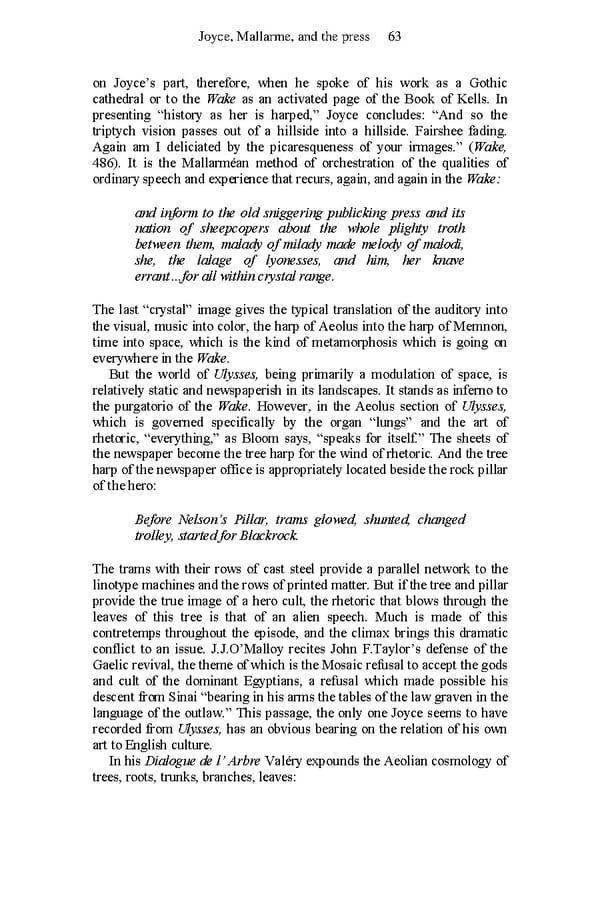Joyce, Mallarme, and the press 63 on Joyce’s part, therefore, when he spoke of his work as a Gothic cathedral or to the Wake as an activated page of the Book of Kells. In presenting “history as her is harped,” Joyce concludes: “And so the triptych vision passes out of a hillside into a hillside. Fairshee fading. Again am I deliciated by the picaresqueness of your irmages.” (Wake, 486). It is the Mallarméan method of orchestration of the qualities of ordinary speech and experience that recurs, again, and again in the Wake: and inform to the old sniggering publicking press and its nation of sheepcopers about the whole plighty troth between them, malady of milady made melody of malodi, she, the lalage of lyonesses, and him, her knave errant…for all within crystal range. The last “crystal” image gives the typical translation of the auditory into the visual, music into color, the harp of Aeolus into the harp of Memnon, time into space, which is the kind of metamorphosis which is going on everywhere in the Wake. But the world of Ulysses, being primarily a modulation of space, is relatively static and newspaperish in its landscapes. It stands as inferno to the purgatorio of the Wake. However, in the Aeolus section of Ulysses, which is governed specifically by the organ “lungs” and the art of rhetoric, “everything,” as Bloom says, “speaks for itself.” The sheets of the newspaper become the tree harp for the wind of rhetoric. And the tree harp of the newspaper office is appropriately located beside the rock pillar of the hero: Before Nelson’s Pillar, trams glowed, shunted, changed trolley, started for Blackrock. The trams with their rows of cast steel provide a parallel network to the linotype machines and the rows of printed matter. But if the tree and pillar provide the true image of a hero cult, the rhetoric that blows through the leaves of this tree is that of an alien speech. Much is made of this contretemps throughout the episode, and the climax brings this dramatic conflict to an issue. J.J.O’Malloy recites John F.Taylor’s defense of the Gaelic revival, the theme of which is the Mosaic refusal to accept the gods and cult of the dominant Egyptians, a refusal which made possible his descent from Sinai “bearing in his arms the tables of the law graven in the language of the outlaw.” This passage, the only one Joyce seems to have recorded from Ulysses, has an obvious bearing on the relation of his own art to English culture. In his Dialogue de l’ Arbre Valéry expounds the Aeolian cosmology of trees, roots, trunks, branches, leaves:
 Essential McLuhan Page 69 Page 71
Essential McLuhan Page 69 Page 71